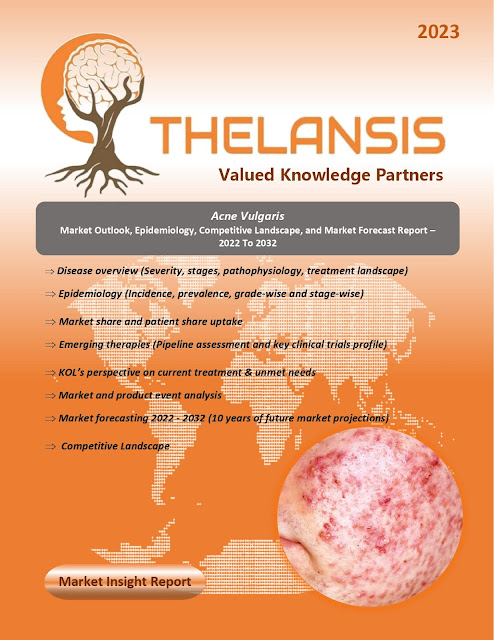Ataxia Telangiectasia (AT) – Market Outlook, Epidemiology, Competitive Landscape, and Market Forecast Report – 2024 To 2034
Ataxia Telangiectasia (AT) Market Outlook
Thelansis’s “Ataxia Telangiectasia
(AT) Market Outlook, Epidemiology, Competitive Landscape, and Market Forecast
Report – 2024 To 2034" covers disease overview, epidemiology, drug
utilization, prescription share analysis, competitive landscape, clinical
practice, regulatory landscape, patient share, market uptake, market forecast,
and key market insights under the potential Ataxia Telangiectasia (AT)
treatment modalities options for eight major markets (USA, Germany, France,
Italy, Spain, UK, Japan, and China).
Ataxia Telangiectasia (AT) Overview
Ataxia
telangiectasia (AT), also known as Louis-Bar syndrome, is a rare genetic
disorder caused by mutations in the ataxia telangiectasia mutated (ATM) gene
located on chromosome 11q22-23. These mutations result in a loss of function of
the ATM protein, which plays a crucial role in cellular DNA repair, cell cycle
control, and cellular response to external triggers such as ionizing radiation
and alkylating agents. The clinical manifestation of A-T is characterized by a
combination of neurological and systemic symptoms, including cerebellar atrophy
with progressive ataxia, cutaneous telangiectasias, increased incidence of
malignancy (particularly lymphoid malignancy), radiosensitivity, immune
deficiency, recurrent sinopulmonary infections, and high levels of
alpha-fetoprotein in serum. The mechanism underlying the formation of
telangiectasia, a hallmark of the disorder, remains unknown. The survival of
patients with ataxia telangiectasia is greatly affected by attentive care and
careful screening, which prevent recurrent infections and early identification
of tumors.
Geography coverage:
G8 (United States, EU5 [France,
Germany, Italy, Spain, U.K.], Japan, and China)
Insights driven by robust
research, including:
- In-depth interviews with leading KOLs and payers
- Physician surveys
- RWE analysis for claims and EHR datasets
- Secondary research (e.g., peer-reviewed journal
articles, third-party research databases)
Deliverables format and
updates*:
- Detailed Report (PDF)
- Market Forecast Model (MS Excel-based automated
dashboard)
- Epidemiology (MS Excel; interactive tool)
- Executive Insights (PowerPoint presentation)
- Others: regular updates, customizations, consultant
support
*As per Thelansis’s policy, we
ensure that we include all the recent updates before releasing the report
content and market model.
Salient features of Market
Forecast model:
- 10-year market forecast (2024–2034)
- Bottom-up patient-based market forecasts validated
through the top-down sales methodology
- Covers clinically and commercially-relevant patient
populations/ line of therapies
- Annualized drug-level sales and patient share
projections
- Utilizes our proprietary Epilansis and Analog tool
(e.g., drug uptake and erosion) datasets and conjoint analysis approach
- Detailed methodology/sources & assumptions
- Graphical and tabular outputs
- Users can customize the model based on requirements
Key business questions answered:
- How can drug development and lifecycle management
strategies be optimized across G8 markets (US, EU5, Japan, and China)?
- How large is the patient population in terms of
incidence, prevalence, segments, and those receiving drug treatments?
- What is the 10-year market outlook for sales and
patient share?
- Which events will have the greatest impact on the
market’s trajectory?
- What insights do interviewed experts provide on
current and emerging treatments?
- Which pipeline products show the most promise, and
what is their potential for launch and future positioning?
- What are the key unmet needs and KOL expectations for
target profiles?
- What key regulatory and payer requirements must be
met to secure drug approval and favorable market access?
- and more…



Comments
Post a Comment